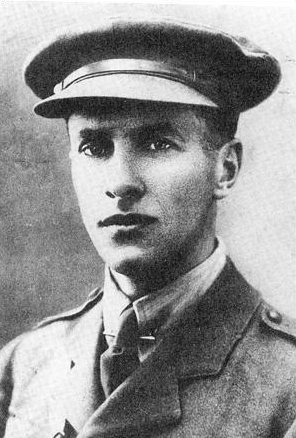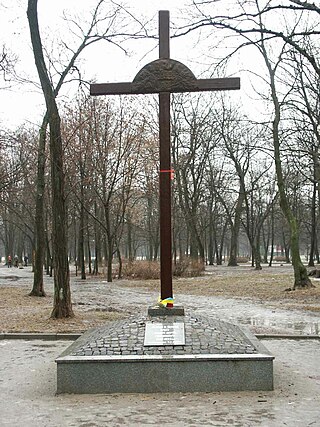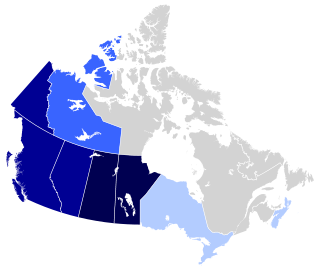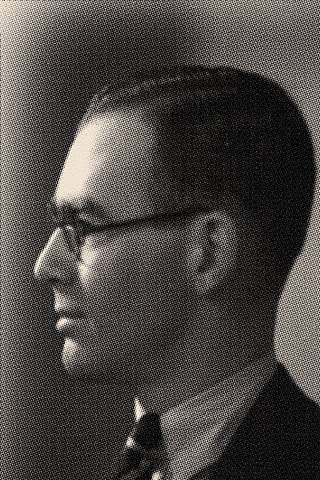
Walter Duranty was an Anglo-American journalist who served as Moscow bureau chief of The New York Times for fourteen years (1922–1936) following the Bolshevik victory in the Russian Civil War (1917–1923).

Filip Konowal VC was a highly decorated Ukrainian Canadian soldier. He is the first Canadian Corps member not born in the British Empire to be awarded the Victoria Cross, the highest award for gallantry in the face of the enemy given to British and Commonwealth forces. He was also entitled to the Cross of St George, 4th Class.

The Holodomor, also known as the Ukrainian Famine, was a man-made famine in Soviet Ukraine from 1932 to 1933 that killed millions of Ukrainians. The Holodomor was part of the wider Soviet famine of 1930–1933 which affected the major grain-producing areas of the Soviet Union.

Ukrainian Canadians are Canadian citizens of Ukrainian descent or Ukrainian-born people who immigrated to Canada.

The Ukrainian Canadian internment was part of the confinement of "enemy aliens" in Canada during and for two years after the end of the First World War. It lasted from 1914 to 1920, under the terms of the War Measures Act.
Jules C. E. Riotte, was a German-born priest of the Ukrainian Catholic Eparchy of Saint Nicholas in Chicago, and a researcher at the Bernice Pauahi Bishop Museum in Honolulu. He was born in Dresden, Germany of mixed French and Lusatian Sorb heritage. During the Second World War, he was active in the resistance movement against the Nazis and he was briefly interned in the Sachsenhausen concentration camp. As a POW, he was sent to Great Britain and worked for the British Broadcasting Corporation as a translator of German and Slavic languages.

Gareth Richard Vaughan Jones was a Welsh journalist who in March 1933 first reported in the Western world, without equivocation and under his own name, the existence of the Soviet famine of 1932–1933, including the Holodomor.

The Soviet famine of 1930–1933 was a famine in the major grain-producing areas of the Soviet Union, including Ukraine and different parts of Russia, including Northern Caucasus, Kuban Region, Volga Region, Kazakhstan, the South Urals, and West Siberia. Major causes include: the forced collectivization of agriculture as a part of the First Five-Year Plan and forced grain procurement from farmers. These factors in conjunction with a massive investment in heavy industry decreased the agricultural workforce. Estimates conclude that 5.7 to 8.7 million people died of hunger across the Soviet Union.

Canada–Ukraine relations are the bilateral ties between Canada and Ukraine.

Holodomor denial is the claim that the Holodomor, a 1932–33 man-made famine that killed millions in Soviet Ukraine, did not occur or diminishing its scale and significance.

In 1932–1933, a man-made famine, known as the Holodomor, killed 3.3–5 million people in the Ukrainian Soviet Socialist Republic, included in a total of 5.5–8.7 million killed by the broader Soviet famine of 1930–1933. At least 3.3 million ethnic Ukrainians died as a result of the famine in the USSR. Scholars debate whether there was an intent to starve millions of Ukrainians to death or not.

Collectivization in Ukraine, officially the Ukrainian Soviet Socialist Republic, was part of the policy of collectivization in the USSR and dekulakization that was pursued between 1928 and 1933 with the purpose to consolidate individual land and labour into collective farms called kolkhoz and to eliminate enemies of the working class. The idea of collective farms was seen by peasants as a revival of serfdom.

Michel-Joseph Bourguignon d'Herbigny was a French Jesuit scholar and Roman Catholic bishop. He was president of the Pontifical Oriental Institute in Rome, and of the Pontifical Commission for Russia. He was secretly consecrated a bishop and was instrumental in a failed attempt to establish a clandestine hierarchy for the Catholic Church in the Soviet Union during the religious persecutions of the 1920s.

The Holodomor was a 1932–33 man-made famine in Soviet Ukraine and adjacent Ukrainian-inhabited territories that killed millions of Ukrainians. Opinions and beliefs about the Holodomor vary widely among nations. It is considered a genocide by Ukraine, and Ukraine's Ministry of Foreign Affairs has lobbied for the famine to be considered a genocide internationally. By 2022, the Holodomor was recognized as a genocide by the parliaments of 23 countries and the European Parliament, and it is recognized as a part of the Soviet famine of 1932–1933 by Russia. As of June 2023, 35 countries recognise the Holodomor as a genocide.

The Castle Mountain Internment Camp, located in Banff National Park, Alberta, was the largest internment facility in the Canadian Rockies, housing several hundred prisoners at any one time. Established on July 13, 1915, a total of 660 enemy aliens were interned at the facility during its entire operation.
The Ukrainian Canadian Civil Liberties Association (UCCLA) (French: L'Association ukrainienne-canadienne des droits civils (AU-CDC)) is a Ukrainian organization in Canada. Established in 1986 after the Civil Liberties Commission (affiliated with the Ukrainian Canadian Congress) was disbanded, its members – all of whom are volunteers – have been particularly active in championing the cause of recognition, restitution and reconciliation with respect to Canada's first national internment operations, helping secure a redress settlement in 2008 with the Government of Canada along with the Ukrainian Canadian Congress and the Taras Shevchenko Foundation. They have also challenged unfounded allegations about the supposed presence of "Nazi war criminals" hiding in Canada, and documented the presence of veterans of the NKVD, SMERSH, and KGB in Canada. The first chairman of the CLC/UCCLA was John B. Gregorovich, a lawyer. The current chairman is Roman Zakaluzny; the immediate past president was Lubomyr Luciuk.
The Limestone Press is a one-man publishing house, established in 1972 by historian Richard Pierce (1918–2004). Pierce lived and worked at that time in Kingston, Ontario, and he chose the name from the nickname of Kingston, the “Limestone City”, which has its origins in its many limestone buildings. He published mainly books on Alaska’s history, mostly concerning its Russian era, but also on Ukrainian and African and other topics, as well as books dealing with Kingston's history.

The Harvest of Sorrow: Soviet Collectivization and the Terror-Famine is a 1986 book by British historian Robert Conquest published by the Oxford University Press. It was written with the assistance of historian James Mace, a junior fellow at the Harvard Ukrainian Research Institute, who started doing research for the book following the advice of the director of the institute. Conquest wrote the book in order "to register in the public consciousness of the West a knowledge of and feeling for major events, involving millions of people and millions of deaths, which took place within living memory."
The Toronto Mandolin Orchestra is a musical ensemble based in Toronto, Ontario, Canada. The orchestra performs both separately and as part of the Shevchenko Musical Ensemble. It was formed in 1956 as a revival of a tradition of mandolin orchestras in Toronto's Ukrainian and eastern European immigrant communities.

Valentina Kuryliw is a historian and educator specializing in the Ukrainian Holodomor genocide of 1932–1933. Now retired, she served as the Department Head of History and Social Sciences for the Toronto District School Board with over 35 years of teaching experience. She is a methodologist, worked with the Ontario Institute for Studies in Education (OISE) at the University of Toronto training young history, law and sociology teachers and evaluating their achievements. She has also travelled extensively throughout Ukraine teaching teachers about human rights, critical thinking skills and the Holodomor in many of its regions since 1993; "Every year Valentina Kuryliw comes to Ukraine – a Canadian of Ukrainian descent, a methodological teacher, a history specialist from Toronto. She conducts courses in the summer in Lviv, Odesa, Ternopil, Lutsk, Khmelnytsky, Donetsk, Kharkiv and thus shows Ukrainian history teachers that teaching can be different. Ms. Valentina has made an invaluable contribution to the development of Ukrainian methodological thought." She taught the history of Ukraine at the Tsiopa Palijiw Ukrainian School Toronto where she was assistant director. From 2009, she is the chair of the National Holodomor Education Committee. of the Ukrainian Canadian Congress; from 2013, the Director of Education of the Holodomor Research and Education Consortium at the Canadian Institute of Ukrainian Studies, University of Alberta ; from 2009, she is a member of the Board of the Ukrainian Canadian Research and Documentation Centre (Toronto). She is a permanent member of the Ontario History and Social Studies Teacher's Association (OHASSTA).












